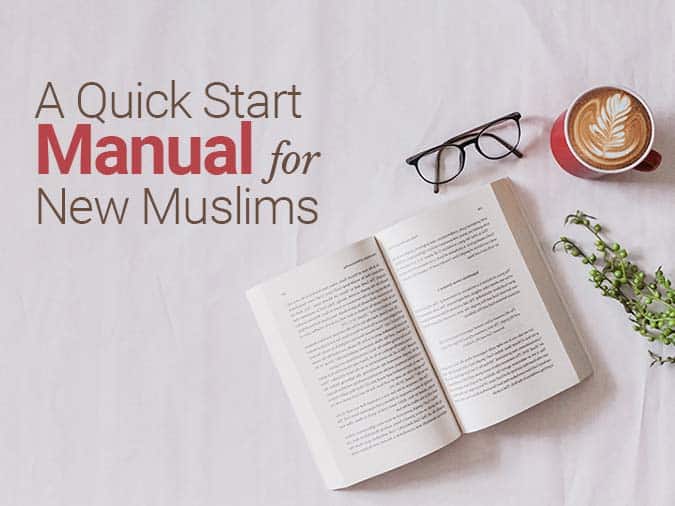By: Laura El Alam
Your Journey Begins with Proclamation of Faith in Allah and Prophet Muhammad (peace be upon him)
Once you proclaim that there is none worthy of worship except Allah, and that Mohammad is the Prophet of God, you have become a Muslim. Congratulations! That is the crucial first step of your journey and indeed the foundation of everything you will do henceforth as a believer.
Practicing Islam fully will require learning, submitting to God, and making a daily commitment to your new faith, but the wonderful thing is that Allah makes it easier for us when our hearts are determined to serve Him.
Embracing Growth, Rewards, and Patience in Our Journey
When we buy a brand new appliance or the latest gadget and we are eager to use it, we often don’t want to read the whole instruction manual. We just want to use it as quickly as possible! Similarly, when we are new to Islam, we often want to dive in and practice our faith from day one. There are numerous things to learn, though, and the process of memorizing every necessary detail will probably take months or years. In fact, forming an Islamic personality — a mindset that allows us to align all our intentions and actions with pleasing our Creator — might take a lifetime.
But no worries! The great news is that Allah rewards us for every single step we take to draw closer to Him. If we struggle to master the words in Arabic, or to remember all the steps of the prayers, or to conquer some of our bad habits, then our rewards from Allah will be exponentially greater than our effort. We should focus on the benefits of the growth process and try to be patient with ourselves as we learn and change.
A Quick Start Guide and Tips for Finding an Islamic Mentor
For those new converts who are still eager to skip the instruction manual and dive right in, here is a helpful “quick start guide.” Included are online resources as well as some recommendations for books, which should be helpful in your spiritual growth. While books, articles, and videos are beneficial, one of the best ways to learn about Islam is from a helpful and willing real-life mentor. This article offers tips on finding a mentor.
In the meantime, the following list will give you a place to start your journey. Wading through so much information online to find the best resources can be tedious, so we’ve attempted to compile some of the best ones for you, whether you prefer to read or watch your content.
1. Five Daily Prayers/Salat:
Read:
This link offers an extremely helpful and straightforward guide to performing the five daily prayers. Photos and descriptions explain exactly how and when worshippers should stand, kneel, and bow. English translations of the Arabic words are provided.
Install:
There are several apps that help keep track of prayer times and even point out the direction of the Qibla. “Muslim Pro” is one of the most popular, but there are many options.
The “Quran Hive” app helps users listen to the Quran in Arabic with an English translation. This will help to memorize and understand the chapters.
2. Making Ablution (wudu):
Read:
This link provides a written description of ritual cleansing, plus photos.
Watch:
This video shows the process of making wudu.
3. Islamic Dress Code
Read:
Here is a description of the modesty requirements for Muslim men and women.
Watch:
This video lecture explains the Islamic ruling on men’s and women’s dress.
This inspiring video by Sister Aminah Assilmi (may Allah have mercy on her soul) explains why Muslim women wear the headscarf, and how it is empowering.
4. Fasting During the Month of Ramadan:
One of the five pillars of Islam, the monthlong fast of Ramadan is required of all Muslims of sound mind and health who have reached the age of puberty.
Read:
This link provides many of the rules and regulations of fasting.
Watch:
A very basic summary of Ramadan with some helpful tips.
5. Glossary of frequently-used terms:
Read:
When you start practicing Islam, you’ll be introduced to a number of new terms, mostly in Arabic. It can be a bit overwhelming to learn so many new words, particularly when seasoned Muslims tend to use them without even realizing that new converts might not know what they mean. First of all, never be afraid to ask for clarification. It’s okay not to know everything! Also, feel free to study a “cheat sheet” like this one, that includes many Islamic phrases, from A to Z. Also read FAQs.
Watch:
These videos made by converts, address some of the most commonly-used Islamic phrases and their translation into English.
Recommended Books:
I asked numerous converts what books they would recommend to a new Muslim, and they suggested these titles:
- The Qur’an: A New Translation by M.A.S. Abdel Haleem
- The Clear Quran translated into English by Dr. Mustafa Khattab
- The New Muslim Guide by Fahd Salem Bahammam
- The New Muslim’s Field Guide by Theresa Corbin and Kaighla Um Dayo
- Welcome to Islam: A Step-by-Step Guide for New Muslims by Mustafa Umar
- How to Pray: A Step-by-Step Guide to Prayer in Islam by Mustafa Umar
- Essentials of Islamic Faith: For Parents and Teens by Suhaib Webb
- If I Should Speak by Umm Zakiyyah
- Reclaim Your Heart by Yasmin Mogahed
- A Temporary Gift by Asmaa Hussein
- A Place of Refuge by Asmaa Hussein
- Purification of the Heart by Hamza Yusuf
- Being Muslim: A Practical Guide by Asad Tarsin
- Believing as Ourselves by J. Lynn Jones
- In the Footsteps of the Prophet: Lessons from the Life of Muhammad by Tariq Ramadan
- Islam and Christiantity: The Choice by Ahmed Deedat
- Joy Jots: Exercises for a Happy Heart – Second Edition by Tamara Gray
- The Road to Mecca by Muhammad Asad
- From My Sisters’ Lips by Na’ima B. Robert
- In the Early Hours: Reflections on Spiritual and Self Development by Khurram Murad
- A Beginner’s Book of Salah by Ghulam Sarwar
- Before You Tie the Knot: A Guide for Couples by Salma Elkadi Abugideiri Lpc, Imam Mohamed Hag Magid
- Before the Wedding: 150 Questions for Muslims to Ask Before Getting Married by Munira Lekovic Ezzeldine
Raised in a Midwestern Catholic family, Laura El Alam became a Muslim in 2000. She is a prolific writer whose work has been published in various magazines. Laura is the founder of Sea Glass Writing & Editing www.seaglasswritingandediting.com and runs the Facebook page The Common Sense Convert which aims to provide a beneficial online forum for Muslim women.
Got Questions?
We have Answers. Get in touch now.








